EA resilience to catastrophes & ALLFED’s case study
By Sonia_Cassidy @ 2022-03-23T07:03 (+91)
Summary
This is a case study on how The Alliance to Feed The Earth In Disasters (ALLFED) has activated its response capabilities due to the invasion of Ukraine (with its potential for global food systems risks and nuclear war).
Additionally:
- We believe that resilience and response should be built up in the EA community. In this post, we list some ways in which ALLFED can support such resilience-building.
- We summarise actions that we have been taking over the last 3 years in order to build up our own operational resilience and response capabilities.
- We look at some relevant organisational background and give an overview of ALLFED as a ‘think-and-do’ tank, to show how it informs our overall actions and thinking.
- We share what would be useful to us, notably:
- People connected to search engine and social media companies to help develop messaging related to GCRs (Global Catastrophic Risks)
- People interested in becoming a part of a Rapid Response Task Force (provisional name), ideally outside of major NATO cities, sign up here
- People interested in working with us to develop access to resilient foods in the event of a catastrophe (anything from accessibility of information to more resilient infrastructure)
- Access to medium-term funding (for 2023 onwards), so that we are able to fully focus on our core work (rather than also expanding a portion of our energies on fundraising).
- We are currently recruiting for multiple positions to increase capacity (apply here)
Introduction
Hello, and welcome to my first EA Forum post.
I have been the Director of Operations for The Alliance to Feed The Earth in Disasters (ALLFED) for over 3 years. During this time, I have contributed to many of ALLFED’s posts here. Recent events, and the inquiries we have been receiving (of relevance to my specific areas of work) are what prompt this post.
You may already know ALLFED as an EA-aligned organisation, with the mission to help feed the world in the case of catastrophes. We seek to identify various resilient food solutions and to help governments, companies, and organisations implement these solutions, to help feed everyone in the event of a global catastrophe. We also provide policy recommendations on both resilience and response, and are developing financial products and models to increase resilience to global catastrophic food risks. We focus on events which could deplete food supplies or access to 5% of the global population or more.
In addition to our core work, as members of the EA community we of course concern ourselves with our overall place in the world, and with being good citizens of this community.
Over the last few weeks, ALLFED as an organisation as well as multiple individual team members, have been receiving inquiries about the actions we might recommend with regard to the developing socio-political crisis, and what we think might be useful for other EA community members and organisations to be doing during this time, especially with regard to food system impacts, provisions and nuclear risk.
We have quite a lot to say about resilient foods and nuclear winter, for example, please see the Resilient food solutions and Catastrophic risks to food sections of our website.
We are not experts on personal and organisational preparedness, and cannot advise on that. Thankfully, there is a wealth of information out there already on general preparedness for all kinds of scenarios, including nuclear ones. Scores of anti-nuclear organisations have developed resources to address this very issue (nuclearweapons.info being just one example). Some posts on the subject are beginning to emerge here on the EA Forum, including this one by Finan Adamson, ALLFED’s long-standing associate.
What we can do is to share, by way of a case study, what ALLFED has been working on internally with regard to this, both in the recent weeks and in the recent years. Should any of this inspire or be of use to other EA organisations, or the community as a whole, this post will have served its purpose.
ALLFED as a ‘think-and-do tank’
To understand the scope of our work, it is perhaps useful to think of ALLFED as a ‘think-and-do tank’, focusing on both food systems research and the practical applications thereof. I use the example of ALLFED’s crisis response to the current socio-political situation to illustrate how this combination works.
From the outset, and its foundation in 2017, ALLFED has conducted research, analysis, modelling and financial product development, for governments, financial institutions and other key food system stakeholders to increase resilience to GCFRs (global catastrophic food risks). This is visible right across ALLFED, from the team structure to the structure of our individual programs.
This duality of purpose is rooted deep in our origins and embodied by our two co-founders, Dr. David Denkenberger and Ray Taylor. David is ALLFED’s Director of Research and a reasonably well-known EA community member (you can find his latest 80,000 Hours podcast episode here). Ray, ALLFED’s other co-founder, is very different indeed; his strengths lie in practical action and in his experience in health, international development and disaster preparedness (he also supports a number of general humanitarian projects, unrelated to ALLFED). In a nutshell, for models, estimates, and engineering expertise, we go to David (who embodies the analytical/academic part of ALLFED). When in need of out-of-the-box ideas, action or someone willing to travel to another part of the world at the drop of a hat (and manage well there no matter the circumstances), Ray is the one who will be catching the plane.
ALLFED’s Board of Advisors is composed of people with both academic and ‘action’ backgrounds, with 3 individuals particularly relevant to nuclear/response issues:
- Professor Martin E. Hellman, best known as co-inventor of public key cryptography and the recipient of the ACM Turing Award (often regarded as equivalent to the Nobel Prize in computer science), has been very invested in the matters of nuclear disarmament for several decades now. During the 1980s, he helped to develop a meaningful dialogue between the Soviet and American scientific communities on how human thinking had to evolve for survival in the nuclear era, something of a particular relevance to the current situation (his 2021 article on nuclear risks is here).
- Carina Fearnley, a director at the UCL Warning Research Centre, though particularly concerned with volcanic scenarios, is also a disaster management expert.
- Sella Nevo currently leads the Google Flood Forecasting Initiative, with applications to mass warning systems in disaster scenarios.
ALLFED’s ‘think-and-do’ structure is likewise reflected in the composition of our team. In addition to a solid core of researchers, we have plenty of good ‘action’ people, almost all of them with some kind of crisis response or/and communications background. You can read more about them on our website’s team pages, and also towards the end of this post, (as one of the ‘resources’ we can share).
ALLFED's resilience and response work
The core of our work and mission is about increasing resilience of the food systems to catastrophic shocks, and many of our research publications investigate this.
We are eager for our work to translate into more real-world applications. This transition is challenging, but we have already achieved several milestones and have several active collaborations. For example, we have contributed to government policy papers and delivered training to financial regulators and central bankers. We are always eager to connect with potential new collaborators in industry and government, and to have discussions about how to actually apply our research in today’s world.
Seeing that the purpose of this post is to share what we have been up to in terms of organisational resilience, I will first refer to the actions already described in relevant sections of ALLFED’s annual highlights (2021, 2020, 2019).
Over the last 3 years, since my arrival at ALLFED, we have been taking incremental steps to increase our operational resilience in catastrophes.
Although much remains to be done, we are heaps better positioned than we were even a short time ago.
- The last couple of years have made it abundantly clear that ALLFED is not going to run out of work, or opportunities for involvement. What has therefore become one of our biggest challenges was when exactly we should be taking action, and when it is best not to: what is within and what is outside our remit and mission. To facilitate and streamline this, we have developed a decision-making tool, which within 15 minutes or so helps us to triage issues and reach an appropriate decision. This is still getting refined and is very much a work in progress; however, we are already experiencing the benefits of it. Depending on the outcome of the assessment, the decision-making tool points us to one of 4 alert levels:
- Green alert: This means the issue is not of concern to ALLFED and we should continue business as usual. The response team stands down as soon as it's activated, after performing the assessment.
- Yellow alert: This means a situation of potential interest to ALLFED. The recommended follow-up action is to assess, monitor and report, with a lead person appointed for the purpose.
- Amber alert: This requires us to stand up a small response team, for the initial period of 5 working days (while the rest of ALLFED continues their normal work as usual).
- Red alert: This means a full response effort. There is no more business as usual - ALLFED's entire resources are committed to the crisis activation until further notice. (We have not yet had a red alert).
- Since 2020 we have been engaging in team-level practical scenario exercises, conducted by Gareth Jones and facilitated by myself, which any willing team members are welcome to attend. Scenarios we have practised include anything from a volcanic eruption, to solar flares, to personal threat to a team member in another part of the world; we have analysed, reviewed and learned from these exercises. (We certainly welcomed, and participated in, the recent CSER Virtual Scenarios Workshop).
- Covid-19 gave us a chance to develop excellent team care. Our initiatives included team “lived experience” records and monthly Covid-19 team treats to help maintain good spirit during the lockdowns (anything from “the gift of light” to workstation improvements).
- Amanda Cassidy, at the time one of our volunteers, hit the road at this time and surprised us by bringing back from her travels an investigation of possible locations for ALLFED’s hands-on work (i.e. a resilient food pilot project) and/or an ‘EA Resilience Centre’. She scouted one Canadian location in some depth, and came back to us with a full project board, contacts and a possible plot of land. This is clearly well outside ALLFED’s own scope, so no action on this as yet, however, the potential for a larger community project sure got us thinking (self-sufficient, with a federally-certified hydro electric power station sufficient to power circa 440 homes, old mines, mountain peaks on which to mount antennae?).
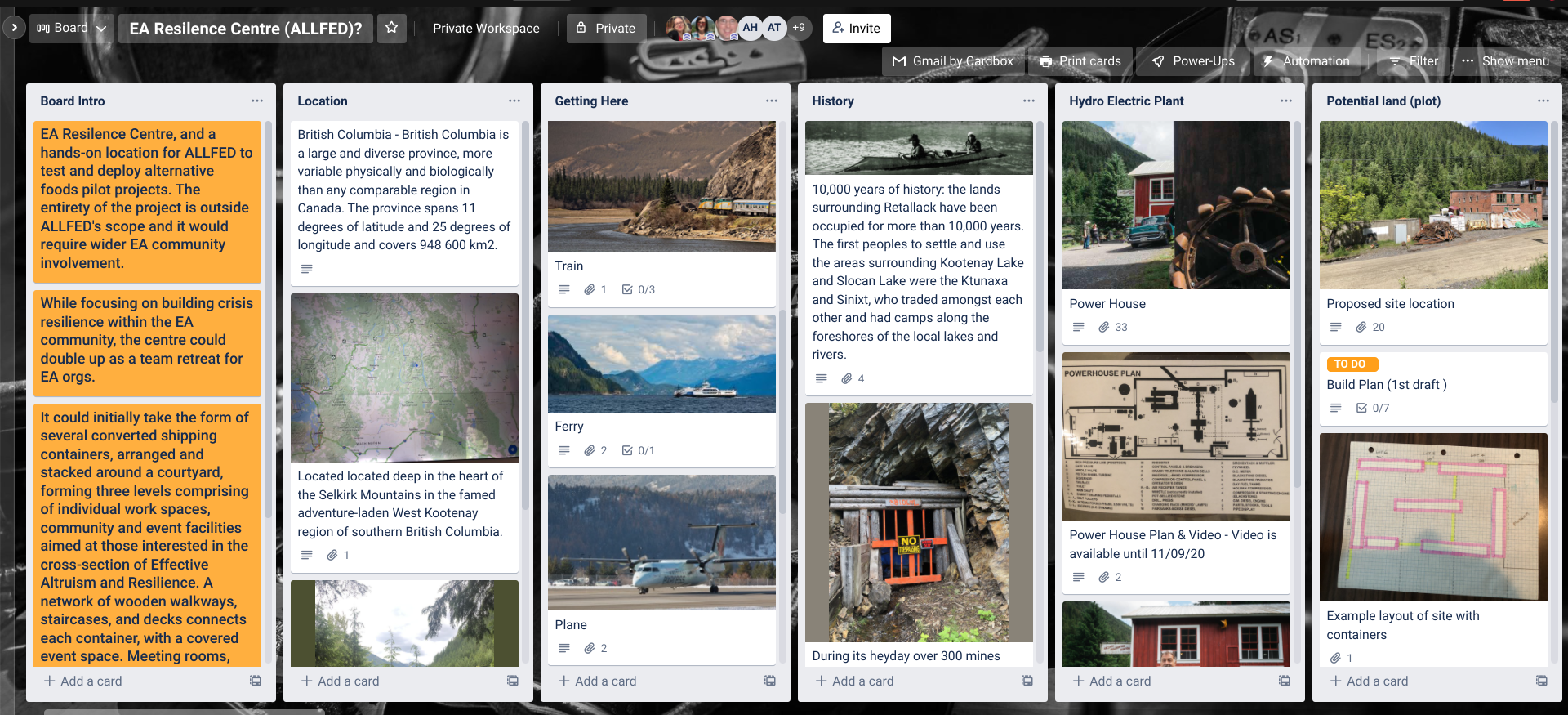
- Also in 2020, we developed ALLFED’s first official crisis response plan, which is of course reviewed on an ongoing basis. This is available as the full document, as well as in pocket and mobile versions.
- Just recently, during EA Global London 2021, we took the opportunity to distribute the pocket version of our response plans to our team members, associates, and key contacts (including Will MacAskill). Two versions exist: one for members of the ALLFED response team and another for general team-wide issue.
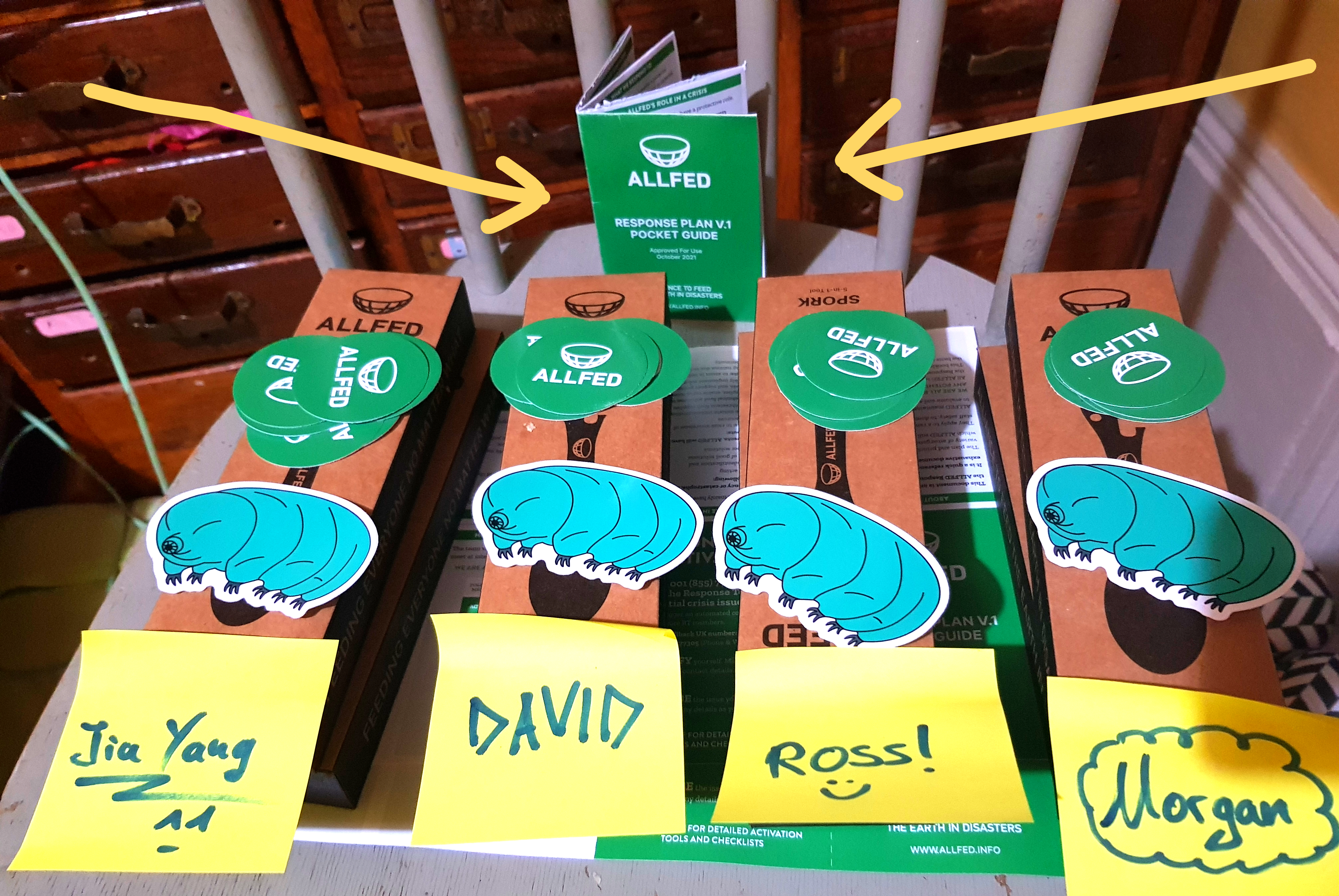
Screenshots of our pocket version of our response plans are included further down in this post. They are, by design, quite straightforward, and designed as printable and foldable A4 sheets of paper. This way, we can update things in real time as often as needed by simply issuing everybody with an updated version of a PDF to print and fold at home. All new team members are told about our response plan, and its pocket versions, during the induction process into ALLFED.
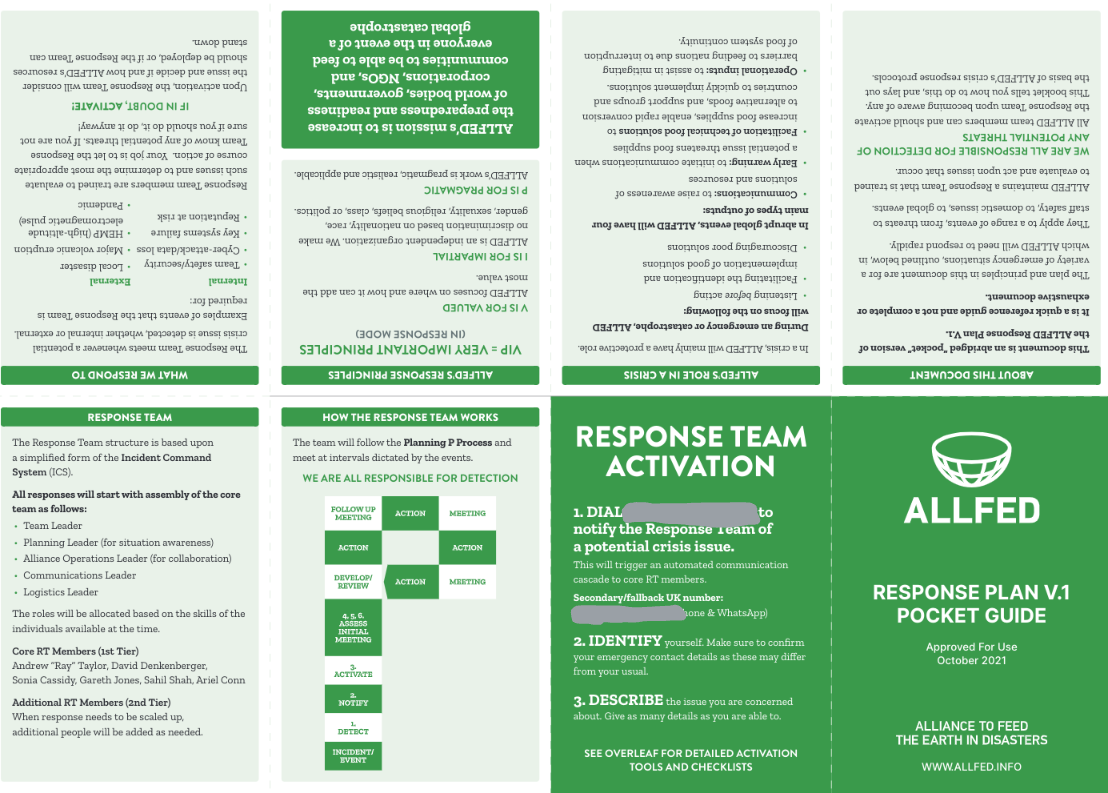
- At the end of last year, the first version of ALLFED’s crisis communications/incident notification system went live, initially in the form of a simple communications cascade (phone/SMS), for the purposes of response team activation. (There are currently 4 methods by which our response team can be activated).
- Just last month (Feb 2022), we created a live team map, to help us visualise the current location of all active team members, and see at a glance whether they might be affected by a developing crisis.
- Automated periodic team location, contact and emergency contact checks mechanism, to keep track of expected increased movement of our personnel in an event of a catastrophe, is scheduled for release this month. (I include it here, rather than in the “current activation” section, as this is a part of our ongoing operational resilience development schedule rather than something specifically related to the current response team activation).
ALLFED’s Russia-Ukraine Response Activation
With the above groundwork in place, we have been monitoring the situation in Ukraine for some time prior to activating our response team. Ultimately, the ALLFED response team was activated immediately upon the Russian incursion into the Ukraine, on February 24, 2022, following our usual activation protocols.
The rationale for activation was the high potential for cascading impacts to the food systems, due to the strategic importance of this region for food exports, as well as for fertiliser supplies. The second reason why we felt an activation of the response team was warranted was nuclear risk, which is very much one of the scenarios that ALLFED focuses on.
The inter-continental response team conveyed the first ‘triage’ meeting within hours of activation, looking at short, medium and longer term impacts.
We used our decision-making tool (as per the section above) to assess the appropriate level of involvement. We decided upon the amber alert, i.e. standing up a small response team, consisting of Response Team Leader, Planning Leader, Communications Leader, Alliance Operations Leader and Logistics Leader.
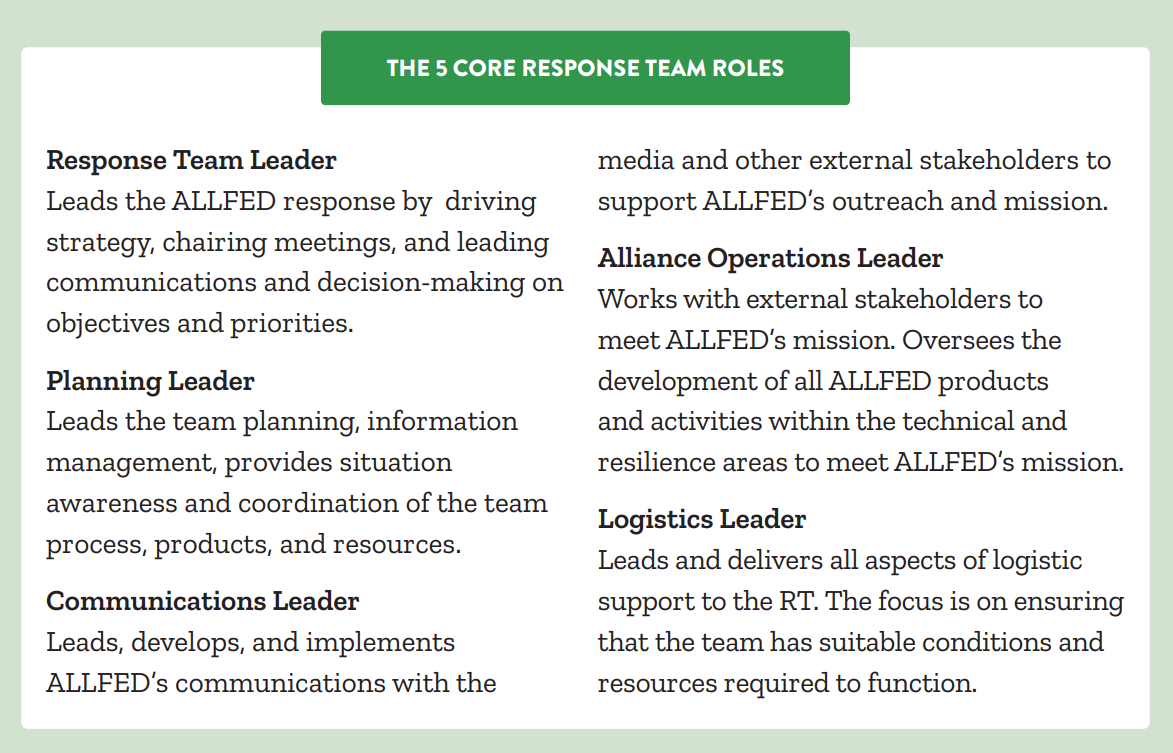
As it was the amber alert level that we decided upon, we proceeded as per the relevant steps of our response plan:
- A dedicated virtual workspace was created for the purpose of the Russia-Ukraine conflict with the necessary resources, data storage and automations.
- Several work streams were created, notably: nuclear, cyber, food impacts, communications, team, finance, logistics and planning.
- ALLFED’s projects were reviewed, and non-essential activities reprioritized; resources were committed so as to allow for ALLFED’s normal work to be continued by part of the team, while part of the team was now in the response mode and working on the issue at hand.
- Team members supporting the activation were reminded of the importance of timely information flow for the response team’s decision-making, with a dedicated project coordinator assigned to the task.
- ALLFED's wider team were notified of the response team activation, and how, while continuing with their own projects, they could at will appraise themselves of the work being done by the response team. Whenever possible, we prefer transparent methods of working and try to foster this at every opportunity.
- Within days of the activation, we also held the first (in this activation) Russia-Ukraine team wellbeing and support meeting, to check in with our team about personal needs and concerns.
- At the time of writing, the response team has been active for just over 3 weeks, with the alert level fluctuating within the amber range.
- Here are some of the considerations that are on the radar of our response team and our broader ALLFED team:
- Cascading risks to global grain and fertiliser supplies, and subsequent impacts on food shortages, prices and planting.
- Nuclear risks, especially with regard to nuclear winter impacts and messaging.
- Identifying salient steps of escalation and corresponding appropriate risk mitigation actions for team members e.g. if NATO announced it would implement a no-fly zone, would we recommend that willing team members relocate outside of major NATO cities? What would potential triggers be for issuing such a recommendation?
- What personal team member protection/mitigation steps should we support/facilitate as an organisation?
What would be helpful for us
The following would help us towards building up our operational capacity in support of our mission (please complete this short form if interested):
- In the case of nuclear exchange and resulting nuclear winter impacts, providing information concerning basic actions, such as ‘fill your bathtub with water immediately,’ would be valuable. However, informing people we could feed (almost) everyone (surviving the original event) if we cooperated may also help avoid panic. As such, a valuable advance action that can be taken to improve response to GCRs is to start working with such entities to incorporate GCR-relevant alerts into their existing work stream.
To this end, we are looking to connect with social media companies: search engines and social media platforms, especially ones which can reach 100’s of millions or billions of people. Several have already developed specific services for this such as Google Public Alerts (which is being applied to floods, earthquakes and hurricanes) and Facebook Local Alerts (employed by Australian state fire service following catastrophic fires of 2019/2020), as well as Apple (Apple Alerts), WeChat, WhatsApp, Instagram, Twitter, SnapChat, TikTok or Reddit.
- We also could do with social media/SEO volunteers/collaborators who would be interested to help us coordinate such work (and ALLFED’s general social media needs).
- As of today, insofar as we have been able to test, ALLFED comes up in almost every first-page return when searching for “feeding people nuclear winter” and many related searches. We are reviewing the resilience of our website/IT infrastructure to be able to handle surge capacity and looking at a host of related IT/cyber matters.
- We wish to start assembling a Rapid Response Task Force (provisional name) of people who would like to assist in our response efforts if a GCR occurs. Everyone is welcome, though individuals outside of NATO cities or, even better, outside of NATO countries would be especially valuable in the current situation (it is possible they would be best placed to undertake and coordinate response or recovery efforts). This might include reaching out to governments, food/industrial related companies, mass media, and social media on how to feed everyone. Individuals with response teams/crisis management/teams coordination experience would also be very welcome. The Rapid Response Task Force idea is at a very early stage of development, however, we would like to gauge what interest there is in this.
Last but not least, we would appreciate any funding opportunities that would free us up to focus even more on our core work. We have Jaan Tallinn and the Survival and Flourishing Fund (2021-H2) to thank for our 2022 funding and the current recruitment round. We are pleased to see David’s and ALLFED’s work recognized as an important cause area and inspiring funding to it (FTX Future Fund). However, for completeness and to give a correct impression of our activities during the current response team activation, it needs to be said that, alongside our regular work and the current response work, out of necessity, we are also expending significant energy on fundraising efforts, to secure further funding (for 2023 and going forward). If you can help with this, please email rick@allfed.info (you can also donate here).
What we can share
Well, there is the resilient foods part (but you already know that).
In addition to ALLFED’s most obvious contribution, we would be happy to join forces, compare notes and/or contribute to any efforts aimed at mitigating food system risk, nuclear risks, and general risks of interest to the EA community.
To start with, we can continue to share/provide more information about the actions we have been taking (as per the sections above). This can be anything from various analysis and insights to practical resources (including editable versions of our pocket response plans - do feel free to customise them for your organisation).
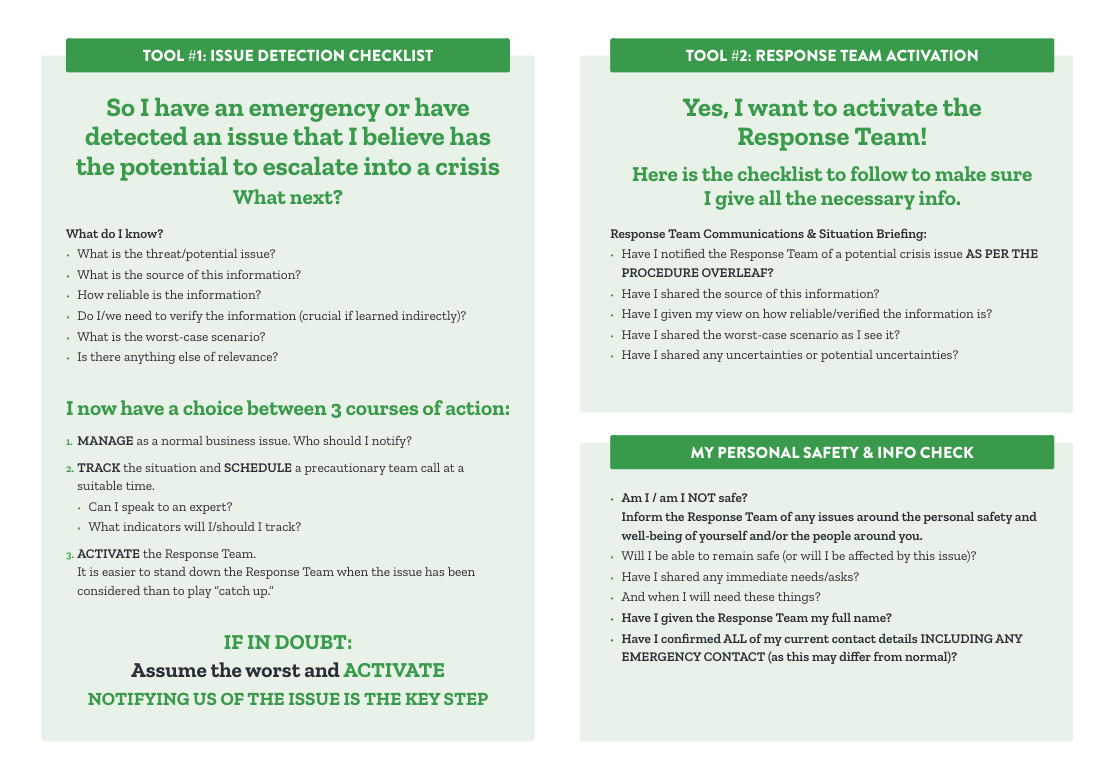
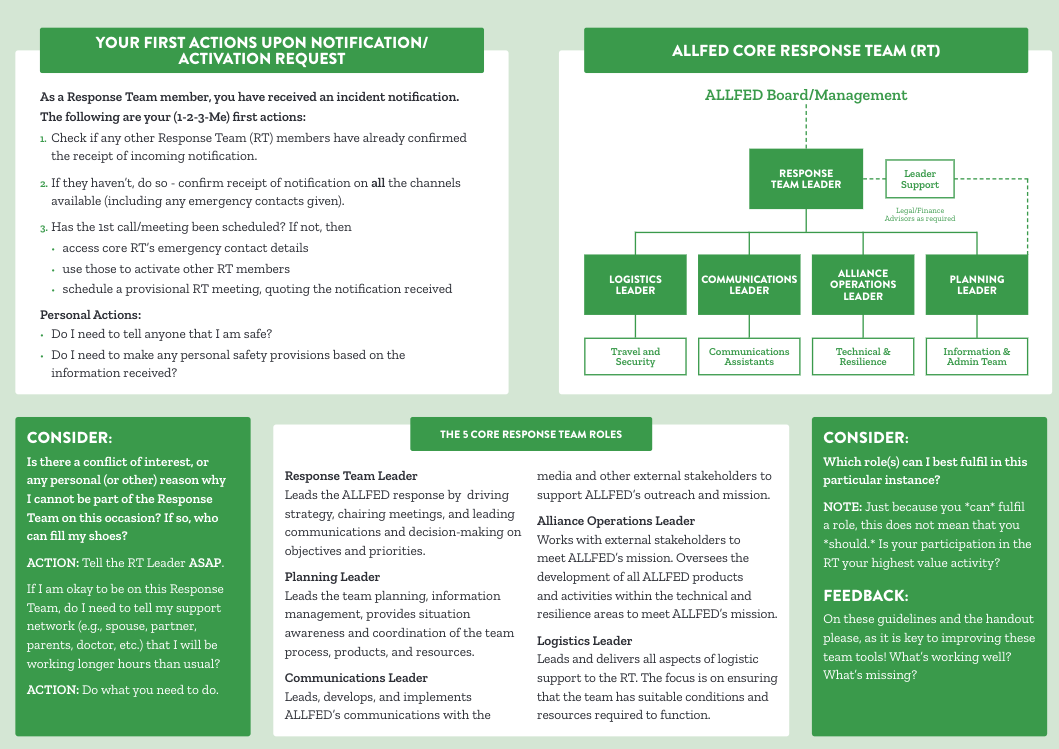
Also on the practical side, some ALLFED team members have begun putting together, as their personal project, a list of several resources intended to improve and build upon Lewis Darnell’s ‘The Knowledge’. If there is an appetite for this, it could potentially be developed into a separate follow-up post.
We have a number of team members with practical experience of operational resilience and crisis communication, who could contribute expertise:
- Al Hundley, our Director of Communications, has spent decades working as a technological consultant for organisations including the UN, NATO, USAID and several corporations. He is a hands-on radio communications expert, specialising in resilient communications.
- Gareth Jones, our resilience specialist adviser, has 35 years experience in organisational resilience and risk management, underpinned by a 21-year military career in operational resilience.
- Ariel Conn, previously at the Future of Life Institute, has contributed to many nuclear disarmament efforts, including the creation of nuclearweapons.info, which is a collaboration of dozens of anti-nuclear organisations to provide information about the threat of nuclear weapons and steps people can take to mitigate nuclear risk.
- You can find my own profile here, with a good mix of academic, operations, response, crisis and communications background.
Finally, there is that initial investigation of one potential Canadian location for the EA Resilience Centre (that our volunteer surprised us with). And people there, whom we have made aware of Effective Altruism, and who would be welcoming of such a project (though of course further investigation would be needed and other potential locations considered).
Closing note
The increased likelihood of nuclear exchange, resulting from the invasion of Ukraine by Russia, highlights the need to accelerate response preparedness for GCRs. A specific challenge with response to crises is providing critical information to people immediately after the onset of the event to improve decision-making. The information shared and timing of sharing will differ depending on the event; however, for many events sharing information widely could improve response by better facilitating coordination. This could start with someone stepping up to coordinate EA resilience and response work.
Over the last 3 years, in addition to working on ALLFED’s own resilience, we have been in contact with EA and non-EA organisations discussing how we might make the EA community more resilient. Not all that much has hatched from these discussions as yet; however, one potential upside of the current situation could be its transformational power. Now would be a good time to transform ideas into actions!
While firmly committed to our core work, and therefore unable to take on the substantial coordination effort ourselves, The Alliance to Feed the Earth in Disasters is interested and open to being approached about EA catastrophe resilience projects, and in particular about their crossover with our work.
If interested, please drop us a line at resilience@allfed.info.
It is my hope that this post, imperfect as it is, might serve to help kickstart some collaborations around this.
Yuli Jadov @ 2022-03-23T22:38 (+20)
First, this strikes me as a great example of the value of the EA community. Most individuals / orgs, like me, will not find the bandwidth to make their own resources and strategies for better response to uncommon scenarios from scratch. Thank you for these.
Second, I think the decision making tool for triage / resource allocation in particular might be really valuable to share. I'm curious if other readers of this comment would agree. I suspect many individuals and orgs in EA struggled to reprioritize around covid, for example. So, sharing may improve overall community calibration. (With the Response Plan & guidelines you've shared adding very valuable context and content for adjustment as you recommend in the post.)
Third, is there an EA temp agency somewhere? I'm imagining the fit difference between that and a normal temp agency is valuable enough even for a temp role, though I'm not certain of it. I ask because ALLFED has had the talent, desire, and mission fit for activating response teams and has thought through this for 3 years. Rapid access to organization capacity may help others make up their shortfall as needed. This seems worth some funder attention, I think.
Lastly, to the degree that collaboration with key stakeholders is practical, I also think a resilience centre and a rapid response task force in EA both have immense value. So I want to voice my public support for these. I'll also reach out to see what help I can most sensibly provide.
Side note: My experience community building in Toronto has given me the strong intuition that really healthy relationships are a vital safety feature of high potential action networks such as a Task Force, rather than a nice-to-have. So I really appreciate that your P Planning meetings 4, 5, and 6 are assessment oriented, that you clarify ALLFED's role in a disaster to include reducing poor decision making, and that your response team response includes team wellness meetings. Thank you for these too.
Sonia_Cassidy @ 2022-03-24T03:23 (+9)
Hi Yuli,
I appreciate the time you have taken to write this comment.
Ref 1: For sure, it takes thought, design, testing, and a bit of relevant background to produce tools from scratch… It was the Covid-19 pandemic that galvanised us to crack on with it. So, if someone wants to adapt them for their org, that is obviously more efficient and they would be very welcome.
Ref 2: I was indeed considering linking to and/or sharing more info on our triage and decision-making aid when writing this post. The reason I decided against it on this occasion is, quite simply, it is not yet in a sharable state (we are still calibrating how it calculates scores and exact weighting).
Ref 3: No idea if there is an EA temp agency - maybe somebody else here can advise.
Ref. your closing comments, great, and thank you for your support of the EA resilience centre idea, and of a rapid response task force. And yes, ignore your team’s needs at your peril. We are all humans, and if your response team - or indeed any team - crumbles, it’s a downward spiral from there. So hurrah to team well-being (as you can see from the pics, ours includes ALLFED sporks and tardigrades :).
Look forward to connecting with you further.
NellWatson @ 2022-03-23T14:46 (+10)
Thank you for sharing this detailed overview of ALLFED's response to this ongoing humanitarian crisis of tremendous scale.
Please keep making a crucial difference for nutrition in these challenging times, especially when an impossible choice between 'heat or eat' is the case for so many all over the world. Thank you.
Sonia_Cassidy @ 2022-03-24T03:18 (+9)
And thank you, Nell, for your supportive first comment on my first post.
PhilC @ 2022-03-23T18:17 (+7)
Appreciate ALLFED's work. I'm curious what ALLFED is seeing and doing about the cascading risks to global grain and fertiliser supplies that you mentioned.
Sonia_Cassidy @ 2022-03-25T16:20 (+1)
Hi Phil, thank you... I understand that you will be seeing Sahil in just a couple of days? He will be happy to talk to you about this.
DPiepgrass @ 2022-11-29T00:00 (+1)
How soon will ALLFED be able to actually deploy emergency nutrition?
I don't know how many additional people died from a lack of nutrition following the invasion of Ukraine, but I'd be a little surprised if it were fewer than direct combat deaths which are probably over 100,000 this year.
Aside from the direct value of saving lives, it's important to demonstrate that emergency food supplies can be deployed at a substantial scale before a global catastrophe actually happens.
FJehn @ 2023-10-05T13:38 (+2)
The food shock resulting from the Russian invasion of Ukraine ultimately turned out comparatively small. ALLFED is looking mainly at food shocks of >10% of global calories. For events below that, especially if they are regional, it is much more cost efficient to trade grain globally. ALLFED's work is about what we could do if this current mechanism fails. Therefore, Ukaine and the resulting food problems are not really solvable with resilient foods, but more of a political problem.
Though I agree with you that it would be great to test out many of the ALLFED solutions before a catastrophe. However, this would cost magnitudes more money than ALLFED currently has.
Anjan Ray @ 2022-03-23T14:52 (+1)
In these especially difficult times, clarity of purpose and specificity of action of the kind highlighted here is quite remarkable. While appreciating the efforts of ALLFED, I would strongly suggest that a channel be opened on the #Mentza platform to spread the word and bring like minded people together.
Best wishes Anjan Ray, India
Sonia_Cassidy @ 2022-03-24T03:19 (+4)
Thank you for these, Anjan. Yup, staying focused is so very important, and the question “is this in scope or out of scope” common. I will check out your recommendation.